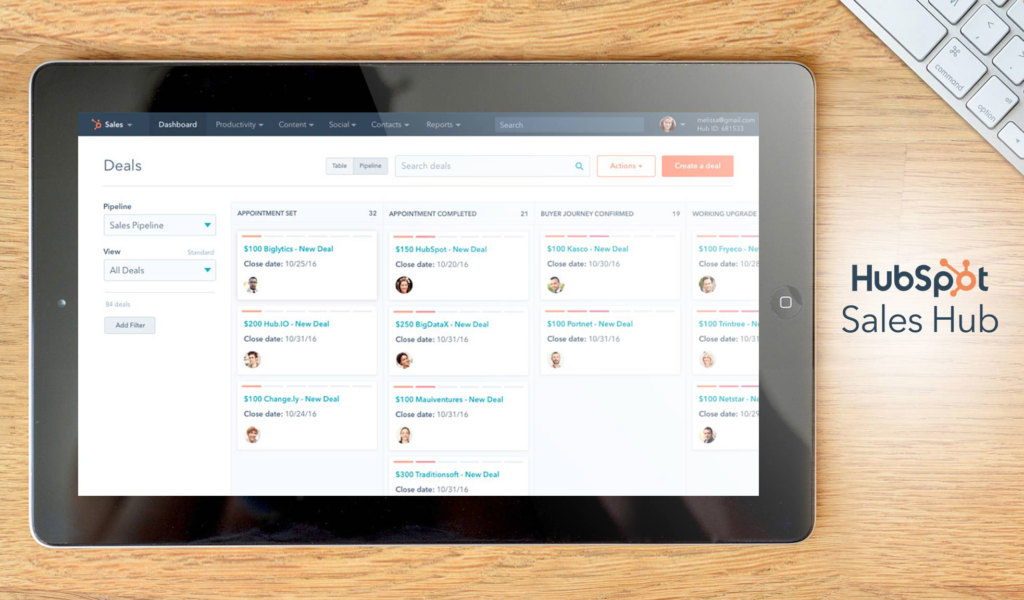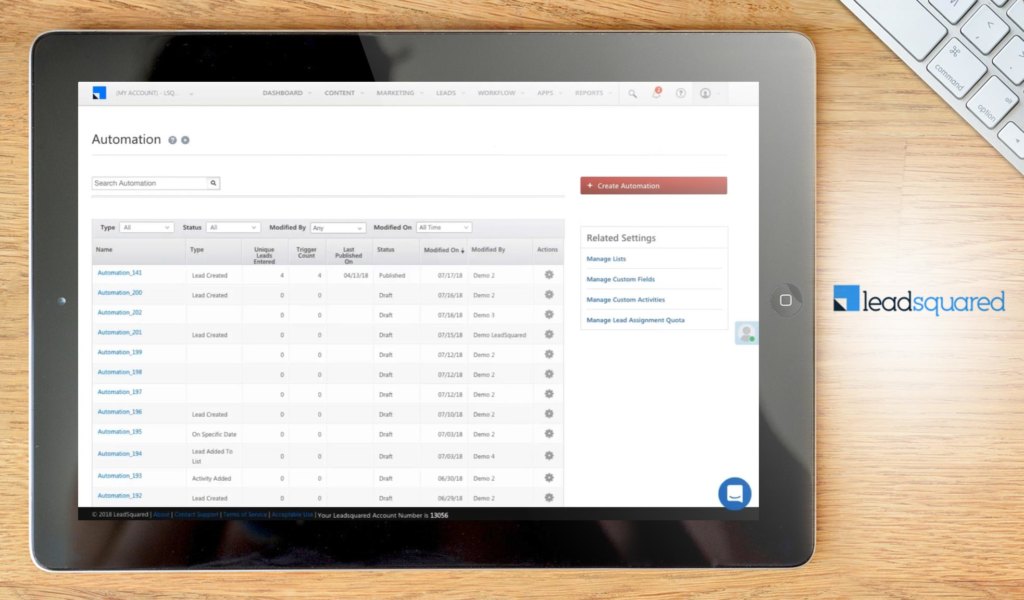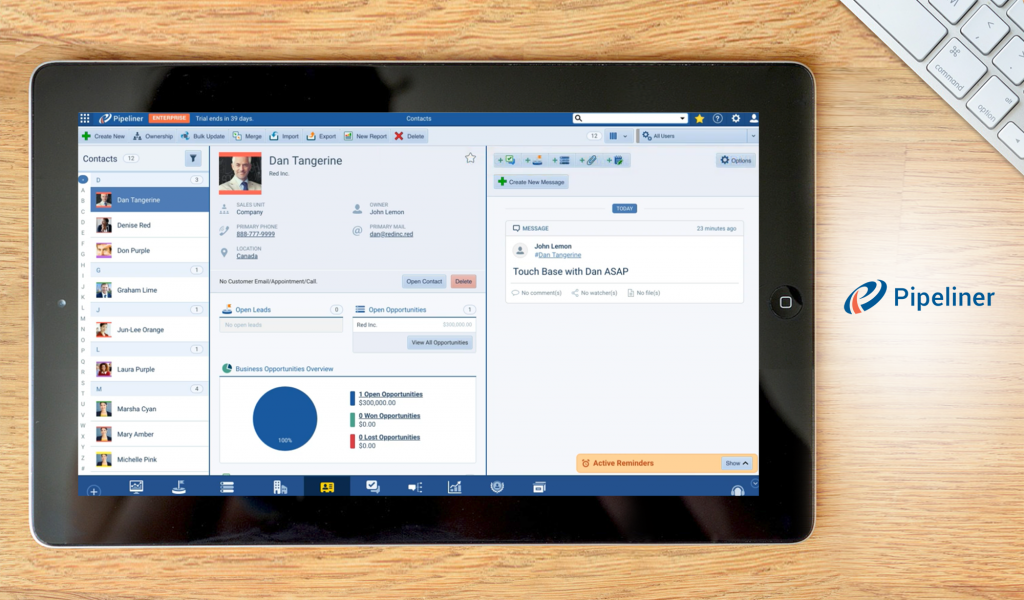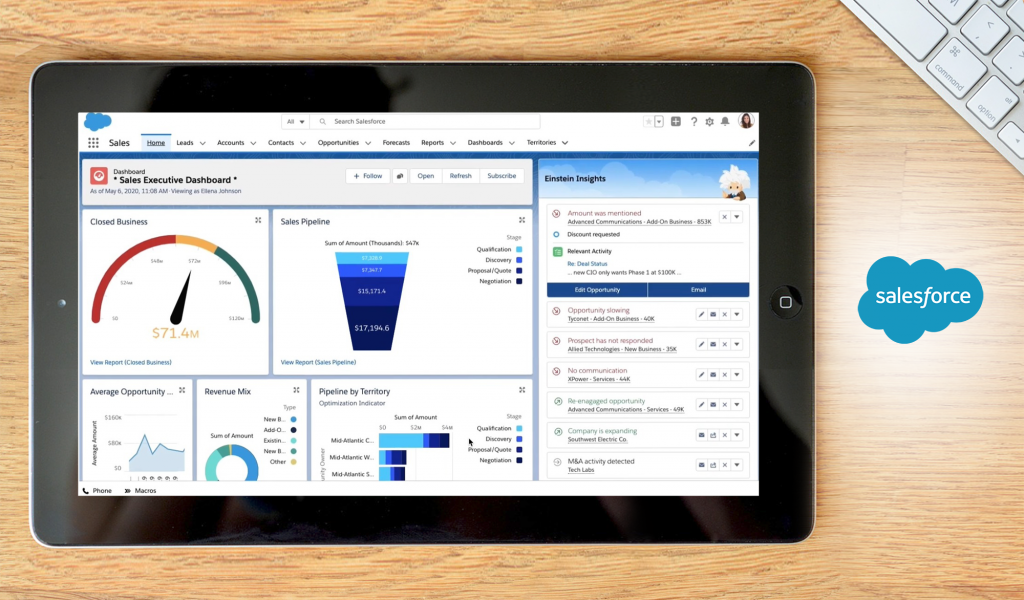The market has largely shifted to become more digitally-enabled in the last ten years. The COVID-19 pandemic not only accelerated this transition but also managed to make certain pockets fully digital. Thus, capturing qualified leads and converting them into paying customers, nowadays, requires the right digital tools. Of course, efficiency and timing are also paramount.
After all, you are competing against other talented sales professionals. The more leads you can attract, the more chances you have of making more sales. So, how do you manage these diverse tasks that will maximize your revenue potential?
You will need a full-featured sales software tool that will manage relevant information in one place. It will allow you to quickly identify potentials and mitigate possible pitfalls using top sales analytics platforms. Additionally, modern sales applications automate repetitive tasks. This will allow you to focus on the most critical parts of your sales. In this article, we list the 10 best sales software tools that can help boost your business.

What are the 10 best sales software tools?
Modern sales software has given sales professionals and businesses valuable tools. These allowed them to capture prospects better, manage inventories, store customers’ data, and more. Additionally, generating reports and analyses based on relevant information is usually just a click away.
However, these enabling innovations have made the sales industry highly competitive. The latest trends in sales show that sales professionals consider competition against low-cost providers and creating competitive differentiation as the top two selling challenges. This is true for most, if not all, businesses from small startups to large corporations.
Thus, companies are continuously trying to improve their sales performance. Top priorities, in this regard, include communicating value (70%), improvement of productivity (65%), and increasing business with existing accounts (64%), among others. These can be best achieved more efficiently with the help of powerful digital tools such as sales-based CRM platforms.
Top Sales Priorities of Companies in 2020
Communicate Value: 70
Communicate Value
%Improve Productivity: 65
Improve Productivity
%Increase Business with Existing Accounts: 64
Increase Business with Existing Accounts
%Improve Retention: 62
Improve Retention
%Inspire Ideas for Sales Reps: 57
Inspire Ideas for Sales Reps
%Win Against Competition: 56
Win Against Competition
%Focus on Sales Managers Effectiveness: 54
Focus on Sales Managers Effectiveness
%Optimize Sales Process: 53
Optimize Sales Process
%Source: Rain Group, 2020
Designed byThese do not only help you automate key workflows, but also help you see relevant data in real-time. This is because salespeople and organizations are now, more than ever, considering a data-driven approach to identify leads and sales opportunities. It is now widely accepted that sales take much more than just gut instinct.
Thus, it is important to examine trends and projected consumer behavior to pursue the right leads. This accurately reflects the key changes in sales in the past few years. Therefore, it is important to mine customers’ data and sales information to gain accurate insights.
How do sales tools help with customer retention?
While sales software tools are commonly used for lead generation and closing deals, they also play a crucial role in customer retention. Retaining customers is often more cost-effective than acquiring new ones and contributes to long-term business growth. Here’s how the best sales tools support customer retention strategies:
- Automated Follow-Ups and Reminders: Many sales tools offer automated workflows to schedule follow-up emails, calls, or special offers for existing clients. Consistent communication keeps the brand top-of-mind for customers and helps build a strong relationship over time.
- Personalized Customer Outreach: Sales software collects valuable customer data that can be used to personalize communication. Features like customer segmentation and behavior tracking allow teams to tailor messages and offer products or services based on individual preferences, improving customer satisfaction and loyalty.
- Customer Feedback Integration: Sales platforms that integrate with customer feedback tools help companies gather insights from current clients. This feedback can be used to refine products, services, or communication methods, addressing any concerns that may otherwise lead to customer churn.
- Analytics for Predicting Churn: Advanced sales software includes predictive analytics that can identify clients at risk of leaving. By analyzing engagement patterns and purchase history, teams can proactively reach out with offers, solutions, or simply personalized messages to re-engage customers.
- Loyalty and Reward Programs: Some sales platforms support loyalty program integration, which incentivizes repeat purchases and strengthens the customer relationship. Tracking loyalty points, milestones, and rewards is streamlined, making it easy for sales teams to reward and recognize long-standing clients.
- Seamless Customer Service Handoffs: Sales software tools often integrate with customer service platforms, allowing for smooth transitions when a customer has issues or questions. This ensures that clients receive prompt and accurate assistance, creating a seamless experience and fostering trust in the company.
List of 10 Best Sales Software Tools
1. HubSpot Sales Hub

HubSpot Sales Hub is a sales CRM solution that is part of the popular HubSpot ecosystem. It provides a suite of sales-oriented features and tools, designed to streamline sales workflows, support data-driven decisions, and enhance customer relationships. The product integrates with the other components of HubSpot’s platform, including Marketing Hub, Service Hub, CMS Hub, and Operations Hub, allowing for a unified view of the customer journey.
The software provides a range of tools for salespeople, including contact, deal, and task management, email tracking and notifications, email templates and scheduling, document sharing, integration with Gmail and Outlook, meeting scheduling, quotes, and live chat. It also offers premium features such as automation, goal setting, productivity tracking, deal stage, task and lead rotation automation, sequences, custom reporting, custom objects, predictive lead scoring, and playbooks. These tools are designed to help sales teams shorten deal cycles and increase close rates. The product offers both free and premium editions, allowing businesses to choose the level of functionality that best suits their needs.
Detailed HubSpot Sales Hub Review
2. Sales Creatio

Sales Creatio is an end-to-end sales automation platform that helps small to midsize businesses manage their entire sales cycle, from lead management to invoicing and CRM functionalities. It’s a low-code solution with helpful tools to boost your sales productivity and make it easier for you to manage your sales activities. In addition, it allows you to integrate all your sales channels in a unified platform, enabling you to have an effective collaboration between your sales force and distributors.
Sales Creatio’s collaboration tools help your team work together efficiently. For instance, it has a visual team calendar where you can plan work schedules and meetings and have a complete overview of ongoing tasks and activities. It also has a communication panel where you can collaborate with your team and customers, make calls, manage emails, and get social media updates and notifications directly from the platform.
Moreover, the software has lead management features that let you generate, capture, and manage leads from various sources. Sales Creatio also allows you to analyze statistics on leads, such as the quality and the number of new leads you are getting each day. This helps you turn prospects into sales-ready opportunities.
Detailed Sales Creatio Review
3. ConnectWise Manage

ConnectWise Manage aims to unify unique activities right in one business management platform. It eliminates the need to use several systems by combining project management, sales management, customer service, billing processes, and more in one seamless system. Furthermore, it collects and stores all your data so you can easily gain full visibility over all of your operations.
This fully-featured project management platform allows you to create, manage, and assign projects with diverse components. You can monitor supply and purchase orders, maintain customer relationships, and even develop marketing strategies. Its powerful reporting module allows you to generate valuable information about the progress and status of your many projects. You can make data-driven decisions in real-time to maximize potential opportunities and minimize issues.
Detailed Connectwise PSA Review
4. Pipedrive

If you want a solution to manage your sales pipeline and CRM tasks, Pipedrive is the answer. It’s a strong contender on our list of 10 best sales software tools. The app is designed using activity-based sales methodology and streamlines the sales process to enable you to convert potential deals into successful sales. Top features include roles and organizational hierarchy, full customization, robust API, contact history, goal setting, and reporting. The vendor also offers a great free trial that lets you try out all the key features of the app first.
What makes Pipedrive such an outstanding sales and CRM system? To start, it gives sales reps complete visibility over various sales pipelines. You can view deal progress stages as well as the details of actionable items in the user interface. Plus, you can track pending actions in each pipeline. On top of that, you can utilize the reporting tools to generate visual sales reports, analyze sales data, and monitor team and individual targets.
Pipedrive easily connects with leading email clients, CRM tools, and third-party applications such as Zapier, Trello, MailChimp, Google Maps, and more. There is a convenient 30-day free trial and three paid packages starting from $10/user/month (annual billing) for the Silver plan.
Detailed Pipedrive Review
5. Zoho CRM

Zoho CRM is a web-based customer relationship management solution built for businesses of all sizes. At its core, it offers a lead management and contact management module to help you keep tabs on all your prospects and existing customers. It also offers robust sales force automation options and custom workflow management tools, allowing it to quickly adapt to your existing processes. It even comes with sales tracking and forecasting tools to help you gain insights into your sales performance.
Aside from the abovementioned, Zoho CRM also offers social and mobile CRM tools. As such, users can use a single hub to manage social media interactions as well as SMS interactions. Moreover, as it is part of the Zoho productivity suite, users can integrate it with any other solution from the vendor.
In case you are interested in this solution, Zoho CRM offers a free plan which is great for small teams looking for only the basic CRM features. Of course, if you want more advanced tools or have a larger customer base to tend to, Zoho CRM also offers paid plans ranging from $18/user/month to $55/user/month. You may also take advantage of their free trial plan to get a closer look at what it has to offer before committing to a subscription plan.
Detailed Zoho CRM Review
6. LeadSquared Sales + Mobile CRM

As an advanced sales software, LeadSquared assists businesses in managing their sales process. It streamlines lead management and automates the sales process, allowing sales teams to concentrate on closing deals. Lead management, sales automation, analytics, reporting, and integration with leading marketing platforms are all platform features. These make it a complete sales process improvement solution.
The integration features of LeadSquared are crucial if your team relies on other platforms. It works with Mailchimp, Salesforce, and Google Ads to provide organizations with a unified client view across all channels. Sales teams can use current customer data to generate targeted marketing efforts that increase sales. The platform’s easy-to-use interface and customizable pricing plans make it simple for businesses to start and scale sales.
The real-time sales insights provided by LeadSquared are a significant benefit. The platform offers accurate analytics and reporting to assist organizations in developing and making data-driven decisions. This improves sales teams’ performance and processes and allows them to close more deals. LeadSquared streamlines sales, boosts performance, and increases revenue.
Detailed LeadSquared Sales + Mobile CRM Review
7. Pipeliner

Pipeliner is a CRM application that was designed to be an effective sales tool. It aims to deliver high engagement with you and your customers. The platform features a user-friendly interface, which means you can fully take advantage of its functionalities even without a dedicated administrator. You will only need a few hours to master the drag-and-drop UI. It is also easy to fine-tune the entire software using the settings in the dashboard.
The application allows you to manage and monitor all sales pipeline stages. That means you can follow your clients’ entire customer journey from lead capturing to repeat purchases. The integrated reporting functionalities also provide a big-picture view, so you always know where your business is headed. You can also see how your members perform, forecasts, opportunities, and other business intelligence insights.
Detailed Pipeliner Review
8. Salesforce CRM

Salesforce CRM is one of the leading and most popular CRM software in the market. This award-winning platform has powerful automation capabilities. Sales representatives can maximize those to be more efficient in their tasks. Plus, they can utilize it to identify the most valuable leads to focus their efforts.
What’s more, Salesforce CRM has other tools that can make sales agents productive such as the Salesforce Sales Cloud. This can generate customer data in real-time to provide in-demand intelligence. Apart from that, it can create reports, sales forecasts, and territory models that users can utilize for critical decision-making.
Additionally, organizations can extend the capabilities of Salesforce CRM. It can connect with other solutions in the Salesforce family. On top of that, it can integrate with external applications like accounting platforms, ERP software, and helpdesk solutions. There are more possibilities that customers can unlock starting at $25/user/month.
Detailed Salesforce CRM Review
9. Freshsales

Freshsales is a feature-rich sales management tool that gets the sales team organized and facilitates the entire sales cycle through automation. From lead generation to the final stages of closing a sale, Freshsales provides sales teams with advanced features that make use of AI in managing contacts, accounts, and sales funnels more efficiently.
Since the sales process requires constant monitoring of leads, Freshsales makes this process easier by organizing contacts into categories such as page visits and email activity, including their actions while visiting the product website. In addition, detailed customer profiles can be created on the platform which provides sales teams with important insights on how to choose the right pitch that can address the pain points of the customer.
Among the advanced features of Freshsales is Freddy AI, which provides insights on the status of activities in the pipeline, and also makes revenue projections for potential deals. The custom reports generated by the software help managers analyze sales performance based on advanced metrics.
Detailed Freshsales Review
10. Katana

Katana is a cloud-based material requirement planning software that is perfect for small and medium-sized companies. The platform unifies many manufacturing data and processes all in one place. You can plan, schedule, manage, and modify your manufacturing and inventory process using one application.
You can easily see opportunities and potential issues on the Katana dashboard. It provides a comprehensive view of orders, processes, and deadlines. The platform also seamlessly integrates with many sales and business software such as Xero, WooCommerce, BigCommerce, Shopify, and Quickbooks. That means running your store is efficient and smooth.
Detailed Katana Review
Choosing the Right Sales Software Tools
Selecting the right sales software tool for your business starts by understanding your priorities and needs. Your current system might need an extra boost from one of the platforms on the list above. Or, you might benefit more from changing your entire workflow and business application altogether.
Most, if not all, industries are getting more competitive as new technology penetrates many business processes. This means, to get ahead, you have to be more efficient and strategic than most of your competitors. Additionally, modern consumers are smarter, especially in supporting businesses. Maintaining a good relationship requires using sales management software that will enable you to have a seamless process on your end.
Intelligent solutions like HubSpot Sales Hub not only allow you to achieve your sales target but also optimize your entire operation. Modern sales applications use advanced features like automation and cloud technology to create a more efficient system. If you want to investigate the features closely, you can easily try out HubSpot Sales Hub for free.
Key Insights
- HubSpot Sales Hub is highly recommended for its user-friendly interface, seamless integration with marketing tools, and comprehensive features.
- The digital shift, accelerated by the COVID-19 pandemic, has emphasized the importance of digital tools in sales.
- Sales software tools can significantly improve efficiency, lead management, and the ability to close deals.
- Modern sales applications offer features such as contact management, email tracking, automation, and robust analytics.
- Companies prioritize improving productivity, communicating value, and increasing business with existing accounts.
- Data-driven approaches and real-time analytics are essential for identifying leads and sales opportunities.
- Leading sales software tools include HubSpot Sales Hub, Sales Creatio, ConnectWise Manage, Pipedrive, Zoho CRM, LeadSquared Sales + Mobile CRM, Pipeliner, Katana, Salesforce CRM, and Freshsales.
- Integration with other business applications and seamless data flow across platforms are crucial features of top sales tools.
- The choice of sales software should be based on a business’s specific needs and priorities.
FAQ
- What is the best sales software tool? The best sales software tool is HubSpot Sales Hub due to its user-friendly interface, seamless integration with marketing tools, and comprehensive features such as contact management, email tracking, and automation. Its robust analytics and reporting capabilities further enhance performance, making it an all-encompassing solution for modern sales teams.
- How has the sales industry changed in the past decade? The sales industry has become more digitally-enabled, with a significant acceleration during the COVID-19 pandemic. This transition has made capturing qualified leads and converting them into customers increasingly reliant on digital tools. Efficiency, timing, and the ability to manage diverse tasks effectively are now crucial for success in sales.
- Why is data-driven decision-making important in sales? Data-driven decision-making allows sales teams to identify leads and sales opportunities accurately, rather than relying solely on gut instinct. By examining trends and projected consumer behavior, sales professionals can pursue the right leads, enhancing their ability to close deals and improve overall sales performance.
- What features should a good sales software tool have? A good sales software tool should include features such as contact management, email tracking and automation, robust analytics and reporting, integration with other business applications, and real-time data insights. Additionally, it should offer tools for managing the entire sales cycle, from lead generation to closing deals.
- How can sales software tools improve productivity? Sales software tools can automate repetitive tasks, streamline sales workflows, and provide real-time insights and analytics. This allows sales teams to focus on the most critical aspects of their work, such as building customer relationships and closing deals, ultimately improving productivity and efficiency.






























Leave a comment!